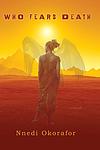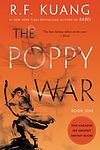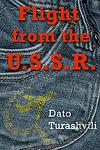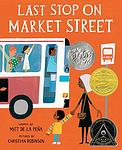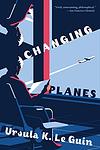The Greatest "Fiction, Social & Cultural Fiction, Speculative Fiction" Books Since 1990
Click to learn how this list is calculated.
This list represents a comprehensive and trusted collection of the greatest books. Developed through a specialized algorithm, it brings together 300 'best of' book lists to form a definitive guide to the world's most acclaimed books. For those interested in how these books are chosen, additional details can be found on the rankings page.
Genres
Social & Cultural Fiction is a literary category that encompasses novels and stories that delve into the complexities of society and culture, exploring themes such as class, race, gender, and identity within specific social contexts. These narratives often provide a lens through which readers can examine the intricacies of human relationships and the impact of cultural norms and societal structures on individuals and communities. By offering a fictional yet reflective portrayal of real-world social dynamics, this genre invites readers to gain a deeper understanding of the diverse experiences that shape our world. Authors in this category frequently use their characters and settings to comment on contemporary issues, challenge prevailing ideologies, and provoke thought about the possibility of social change, making Social & Cultural Fiction a powerful tool for empathy and a mirror for the ever-evolving human condition.
Speculative fiction is an umbrella genre encompassing narrative fiction with supernatural or futuristic elements. This includes genres such as science fiction, fantasy, horror, supernatural fiction, superhero fiction, utopian and dystopian fiction, apocalyptic and post-apocalyptic fiction, and alternate history. The unifying factor of speculative fiction is its departure from the narrative constraints of reality, exploring imaginative and often profound questions that challenge our understanding of the world and our place within it. These stories often delve into themes like the human condition, social commentary, and the exploration of philosophical and ethical dilemmas through the lens of the fantastical or the yet-to-be-possible. By pushing the boundaries of the known, speculative fiction invites readers to consider the myriad possibilities of existence and the potential consequences of our actions in worlds that are, at once, vastly different from and eerily similar to our own.
Countries
Date Range
Reading Statistics
Click the button below to see how many of these books you've read!
Download
If you're interested in downloading this list as a CSV file for use in a spreadsheet application, you can easily do so by clicking the button below. Please note that to ensure a manageable file size and faster download, the CSV will include details for only the first 500 books.
Download-
1. The Famished Road by Ben Okri
The novel centers around the life of an abiku, a spirit child, who resides in the bustling city of Lagos. Despite numerous attempts to return to the spiritual world, the boy is tethered to the physical realm through the love of his mother. As he navigates through the political unrest and poverty of post-colonial Nigeria, he experiences a series of surreal and mystical encounters, all while wrestling with the pull of the spirit world. The narrative is a blend of reality and the supernatural, providing a unique perspective on the struggles and complexities of human life.
-
2. The Children of Men by P. D. James
Set in a dystopian future where mankind has become infertile, the novel centers on a history professor who becomes involved with a group of revolutionaries seeking to overthrow the oppressive government. As the world descends into chaos due to the impending extinction of the human race, a miraculous pregnancy offers a glimmer of hope. The professor must protect the pregnant woman and navigate the dangerous political landscape, while grappling with the implications of a world without children.
-
3. The Underground Railroad by Colson Whitehead
This novel follows the journey of Cora, a young slave on a cotton plantation in Georgia, who escapes and embarks on a journey towards freedom via the Underground Railroad. The book presents a literal version of the historical Underground Railroad, portraying it as a physical network of tunnels and tracks beneath the Southern soil. As Cora travels from state to state, she encounters different worlds and harsh realities, each one illuminating the various forms of oppression Black people faced in America. The narrative is a brutal exploration of America's history of slavery and racism, and a testament to the unyielding spirit of those who fought against it.
-
4. The River Sutra by Gita Mehta
"The River Sutra" by Gita Mehta is a captivating novel that explores the intertwining lives of various characters along the sacred river Narmada in India. Through vivid storytelling and rich descriptions, the book delves into themes of spirituality, love, and the search for meaning in life. As the characters embark on journeys of self-discovery, the river serves as a powerful metaphor for the flow of life and the interconnectedness of all beings. With its lyrical prose and thought-provoking narrative, "The River Sutra" offers a profound exploration of the human experience and the timeless wisdom of ancient traditions.
-
5. Under the Skin by Michel Faber
"Under the Skin" is a novel that follows the story of a woman named Isserley who picks up male hitchhikers in Scotland. However, Isserley is not what she seems - she's actually an alien sent from another planet to capture unsuspecting men, who are then sent back to her home planet to be used as meat. The book explores themes of humanity, morality, and the ethics of the meat industry.
-
6. Exit West by Mohsin Hamid
"Exit West" is a novel that follows the journey of two young lovers, Nadia and Saeed, who are forced to leave their war-torn city through mysterious doors that transport them to different locations around the globe. The couple navigate their relationship while grappling with displacement, loss, and the challenges of adjusting to new cultures. The novel explores themes of migration, identity, love, and the concept of home.
-
7. Who Fears Death by Nnedi Okorafor
This novel is a coming-of-age narrative set in a post-apocalyptic Africa. It follows the journey of a young woman born from a violent act, who is prophesied to bring an end to a brutal regime. As she grows, she discovers her magical abilities and must learn to control them in order to fulfill her destiny. The narrative explores themes of race, gender, and power, while incorporating elements of African mythology and culture.
-
8. Terra Sonâmbula by Mia Couto
"Terra Sonâmbula" by Mia Couto is a captivating novel set in war-torn Mozambique, where two individuals, a young boy and an old man, cross paths and embark on a journey that intertwines their lives. Through their encounters with other characters and their shared experiences, the book explores themes of loss, displacement, and the power of storytelling to heal and provide hope in the face of adversity. The lyrical prose and magical realism elements create a rich and evocative narrative that immerses readers in the complex and haunting world of post-colonial Mozambique.
-
9. A Geração Da Utopia by Pepetela
"A Geração Da Utopia" by Pepetela is a thought-provoking novel that explores the lives of a group of young Angolan intellectuals during the country's fight for independence. Set in the 1970s, the story follows the characters as they navigate through political turmoil, personal relationships, and their own dreams of building a utopian society. With a blend of historical context and fictional elements, the book delves into themes of idealism, disillusionment, and the complexities of revolution.
-
10. CivilWarLand in Bad Decline by George Saunders
This book is a collection of short stories and a novella, all set in dystopian versions of America. The narratives often feature theme parks, which serve as metaphors for the cultural and moral decay of society. The characters are often trapped in low-wage jobs and are struggling to make ends meet, while also grappling with various personal issues. The stories are infused with dark humor and satire, and they provide a critique of capitalism and consumer culture.
-
11. The Poet X by Elizabeth Acevedo
"The Poet X" is a coming-of-age novel that follows the journey of a young girl named Xiomara, who uses poetry as an outlet to navigate her complex life. Set in Harlem, Xiomara grapples with her strict Dominican parents, her evolving understanding of her own identity, and her burgeoning relationship with a boy named Aman. Through her powerful and honest poetry, Xiomara finds her voice, confronts societal expectations, and discovers the strength to define herself on her own terms.
-
12. Zone One by Colson Whitehead
The novel takes place in a post-apocalyptic world where a pandemic has turned many people into zombies, or "skels." The protagonist is a survivor who is part of a team tasked with clearing out the remaining skels in Zone One, the area in and around lower Manhattan. The story alternates between the present and the past, revealing the protagonist's experiences during the initial outbreak and his struggle to hold onto his humanity in the face of such devastation.
-
13. The Poppy War by R. F. Kuang
The book is a fantasy novel set in a world inspired by China's 20th century history. The protagonist, a war orphan, defies societal expectations by acing the empire-wide examination and earning a place at the prestigious military academy. However, her triumph is short-lived as she becomes embroiled in a violent conflict, which forces her to delve into the depths of her own magical abilities, inspired by shamanism. The story intertwines the brutal realities of war, mythology, and the exploration of power in a deeply divided society.
-
14. Voroshilovgrad by Serhiy Zhadan
"Voroshilovgrad" is a powerful novel set in post-Soviet Ukraine, following the lives of several characters who are grappling with the consequences of war, corruption, and economic decline. The story explores themes of identity, love, and the struggle to find meaning in a society that is rapidly changing. Through vivid and poetic prose, the author paints a haunting picture of a city and its inhabitants, capturing the complexities and contradictions of life in a country in transition.
-
15. Flight From The Ussr by Dato Turashvili
"Flight From The USSR" is a gripping and poignant memoir that follows the life of a young Georgian boy, who grows up under the oppressive regime of the Soviet Union. As he navigates the complexities of his turbulent homeland, the protagonist finds solace in his love for literature and dreams of escaping to the West. Faced with numerous challenges and heart-wrenching choices, he embarks on a daring journey that takes him across borders, revealing the resilience of the human spirit in the face of adversity.
-
16. Last Stop On Market Street by Matt de la Peña
"Last Stop On Market Street" is a heartwarming children's book that tells the story of a young boy named CJ and his grandmother as they embark on their weekly bus ride across town. Along the way, CJ learns valuable life lessons about gratitude, empathy, and the beauty in the world around him, ultimately realizing that the journey itself is just as important as the destination. With its vibrant illustrations and poignant narrative, this book celebrates the power of perspective and the joy of finding beauty in unexpected places.
-
17. Quiet Flows The Una by Faruk Šehić
"Quiet Flows The Una" is a poignant and powerful novel that delves into the complexities of war and its lasting impact on individuals and communities. Set during the Bosnian War, the story follows a young soldier named Faruk, who finds solace in the beauty and tranquility of the Una River. As the war unfolds, Faruk's experiences and relationships are tested, and he is forced to confront the harrowing realities of violence and loss. Through vivid prose and introspective narration, the book explores themes of love, resilience, and the enduring human spirit in the face of adversity.
-
18. Wizard of the Crow by Ngugi wa Thiong'o
The book is a satirical exploration of a fictional African dictatorship, focusing on the rule of a despotic leader and the corruption and power struggles within his regime. Amidst this political turmoil, a self-proclaimed wizard and a rebellious young woman become entangled in the machinations of the state, and their actions ultimately challenge the status quo. The novel combines elements of magic realism with political satire, providing a critique of post-colonial African politics while also exploring themes of love, power, and resistance.
-
19. American War by Omar El Akkad
Set in the late 21st century during the second American Civil War, this novel follows the life of Sarat Chestnut, a young girl from Louisiana. As the South refuses to give up fossil fuels, the country plunges into a violent and chaotic war, leading Sarat and her family to live in a refugee camp. Sarat's experiences of loss and hardship fuel her transformation into a hardened instrument of war. The novel explores themes of revenge, the impact of war on individuals, and the cyclical nature of violence.
-
20. Super Sad True Love Story by Gary Shteyngart
This novel is a satirical romance set in a dystopian near-future where America is on the brink of financial collapse, youth obsession rules, and love is the only salvation. The story revolves around a middle-aged, neurotic man who falls in love with a much younger woman in a society where digital communication is the norm, and privacy is a thing of the past. Their relationship unfolds amidst a backdrop of economic and social chaos, providing a poignant commentary on modern life.
-
21. Haunted by Chuck Palahniuk
"Haunted" is a novel composed of 23 stories, all told by people who have answered an ad for a writer's retreat. The individuals are locked inside a theater for three months, with no connection to the outside world. As time goes on, they begin to starve, go mad, and resort to violence. Each character's story reveals their darkest secrets and fears, creating a chilling and disturbing narrative.
-
22. Transmission by Hari Kunzru
The novel centers on a young Indian computer programmer whose dreams of a new life in the United States are derailed by a series of unfortunate events. Desperate to avoid deportation after losing his job, he unleashes a mischievous computer virus in a bid to regain his employer's attention, but the plan spirals out of control. The virus rapidly spreads across the globe, causing widespread chaos and inadvertently linking the fates of an eclectic mix of characters, from Bollywood actresses to ambitious Silicon Valley entrepreneurs. The story is a satirical exploration of the complexities of globalization, the illusions of the American dream, and the unpredictable ways in which technology can disrupt the world.
-
23. Changing Planes by Ursula K. Le Guin
This book presents a unique collection of interconnected short stories that explore a myriad of imaginative worlds accessible through the mundane act of waiting in an airport and "changing planes." The narrative serves as a metaphorical journey, inviting readers to explore diverse societies and cultures that reflect on humanity's vast potential and its flaws. Through these fantastical tales, the book delves into themes of societal norms, communication, and the essence of being, offering a reflective look at our own world by holding up a mirror to the customs, philosophies, and idiosyncrasies of the fictional ones. The stories are woven together with a keen insight into human nature, showcasing the author's prowess in speculative fiction and her ability to transport readers to worlds that are at once alien and familiar.
-
24. Signs Preceding the End of the World by Yuri Herrera
The book follows the journey of a young woman who crosses the Mexico-US border to find her brother. Along the way, she encounters various characters and obstacles that challenge her identity, her understanding of her culture, and her perception of the world. The narrative is filled with allegories and metaphors that provide a deep exploration of migration, language, and identity.
-
25. The Testaments by Margaret Atwood
This sequel to a dystopian novel set in Gilead, a totalitarian society in what was formerly part of the United States, is narrated by three female characters. The book explores the inner workings of Gilead, its politics, and its eventual downfall. It delves into the lives of the women, their struggles, and their roles in the society, providing a deeper understanding of the oppressive regime. The novel also examines themes of power, resistance, and the ways in which systems of control can be challenged and eventually dismantled.
Reading Statistics
Click the button below to see how many of these books you've read!
Download
If you're interested in downloading this list as a CSV file for use in a spreadsheet application, you can easily do so by clicking the button below. Please note that to ensure a manageable file size and faster download, the CSV will include details for only the first 500 books.
Download





